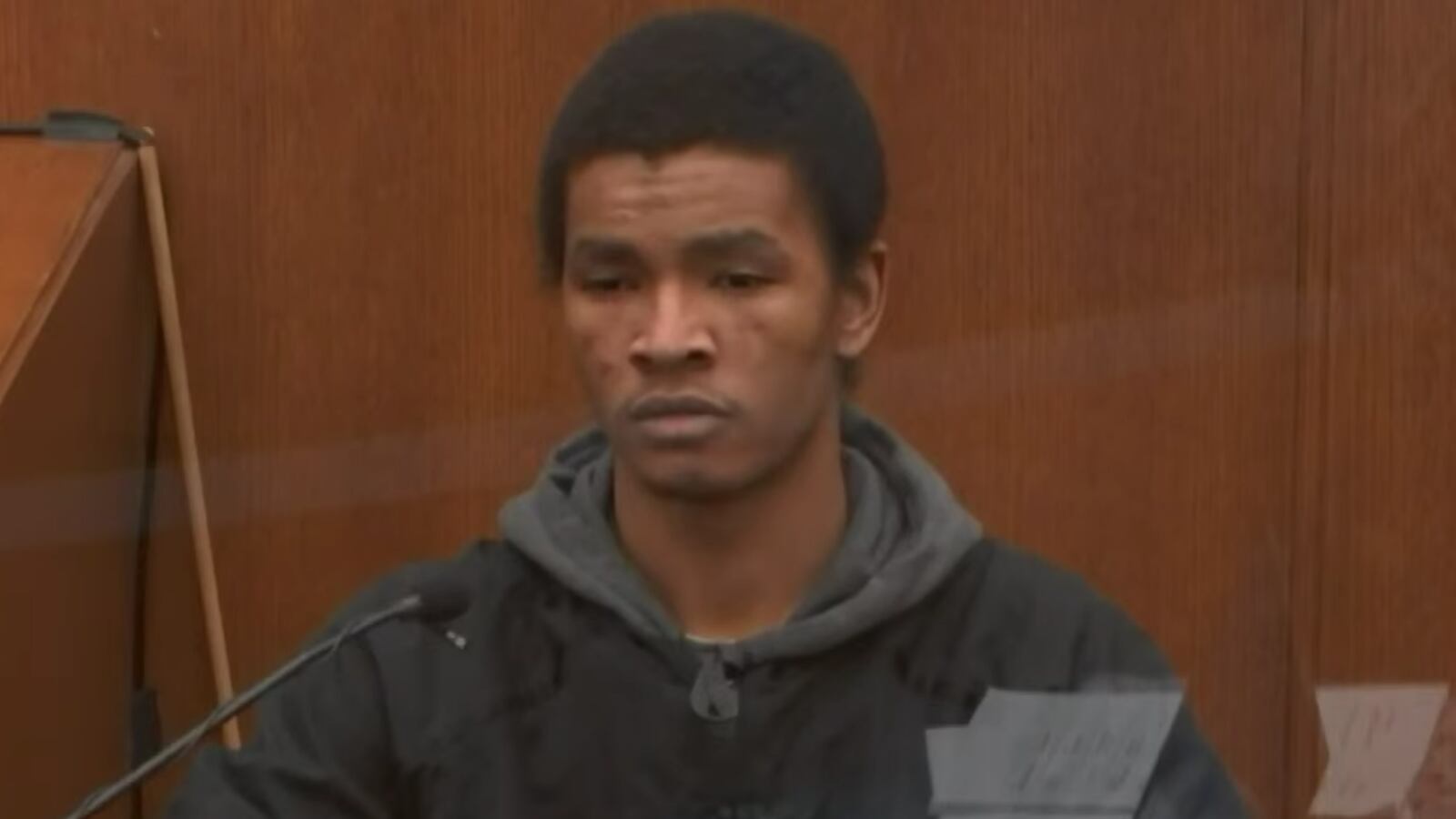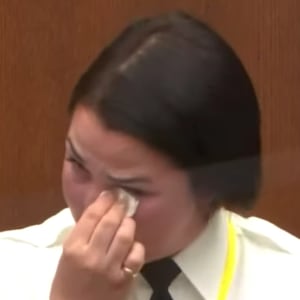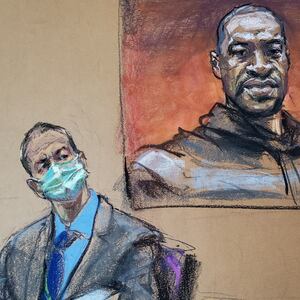When George Floyd handed Christopher Martin a $20 bill to pay for a pack of cigarettes, the 19-year-old Cup Foods employee was immediately suspicious.
“When I saw the bill I noticed it had a blue pigment to it...I found that odd so I assumed it was fake,” Martin told a Hennepin County courtroom on Tuesday, noting that he “took it anyways” and allowed the 46-year-old to leave the store.
But a few minutes later, Martin said, he eventually told his manager—because he didn’t want the money to come out of his paycheck.
“The policy was that if you took a counterfeit bill, you had to pay for it out of your money,” the teenager said, admitting he almost paid it but later “second-guessed” himself.
That decision seemingly led to a tragic sequence of events on May 25 that eventually ended with Floyd’s death after four Minneapolis police officers tried to arrest him over the $20 bill. Prosecutors allege that, during the arrest, Derek Chauvin used excessive force when he kneeled on Floyd’s neck for over nine minutes.
“If I would have just not taken the bill, this could have been avoided,” Martin told the court, adding that he felt “disbelief and guilt” as he watched the subsequent arrest. Chauvin, dressed in a grey suit, stared ahead while the teenager spoke.
Martin is one of nine witnesses who have so far testified against Chauvin, who has been charged with second and third-degree murder and second-degree manslaughter. He faces 40 years in prison if convicted.
Charles McMillian, 61, who witnessed Floyd’s entire arrest and tried to encourage Floyd to comply with the officers, wept in court on Wednesday as he watched a video of Floyd calling out for his “momma.”
“I knew then—in my instincts and in my mind—it was over for Mr. Floyd,” McMillian said.
Chauvin’s defense lawyer has argued that Floyd’s death was the result of health issues and drugs—and that his client was simply doing what “he was trained to do throughout his 19-year career.”
Three other officers—Thao, Thomas K. Lane, and J. Alexander Kueng—have pleaded not guilty to aiding and abetting second-degree murder while committing a felony, as well as aiding and abetting second-degree manslaughter with culpable negligence. They are expected to face a trial together in August.
Martin, dressed in a black hoodie, looked visibly nervous as he described his interactions with Floyd on May 25, stating that he first noticed his “size” when he first entered the Cup Foods.
“He was big,” he said, adding that he asked Floyd if he played baseball. Floyd “took a little long” to respond that he played football, and Martin said it appeared “that he was high.”
The teenager said Floyd bought cigarettes after their brief conversation. Prosecutors played never-before-seen surveillance video of Floyd in the store, showing him standing near the register for a while and appearing to rummage in his pockets. Martin said he was probably waiting in the store while getting his phone fixed.

George Floyd, in a black singlet, captured inside the Cup Food store.
Hennepin County Court via MSNBCAfter Floyd paid for the cigarettes—dancing near the register at one point—he walked out to an SUV. During cross-examination, Martin testified that Floyd’s friend had also tried to use a fake bill earlier that day—and that he refused to take it. He added that he didn’t initially call Floyd out on the bill because he “felt like George didn’t really know it was a fake bill so I felt like I’d be doing him a favor.”
Martin told jurors that after he flagged the suspicious bill to his manager, he went out to the car twice to try to bring him inside to discuss the issue.
The first time, he said, he told Floyd, who was in the driver’s seat, that “the bill was fake and that my boss wanted to talk” to him. Two others were in the car, Martin added.
Floyd “seemed like he didn’t want this to happen. He was like, ‘why is this happening,’” Martin said, adding that Floyd didn’t comply with his request to return to the store.
Martin said his manager told him to try again, even after he offered to pay for the $20 out of his own pocket. During his second attempt, a person in the passenger seat “did most of the talking” before ripping up another counterfeit bill and tossing it out the window. Floyd again refused to go into the store.
Eventually, a manager told one of Martin’s co-workers to call the police, he testified. Police arrived at the store and spoke to a manager. Martin said he later noticed a “commotion” outside the store.
“I saw people yelling and screaming, I saw Derek [Chauvin] with his knee on George’s neck on the ground,” he added.
Several bystanders have testified this week, stating they repeatedly asked Chauvin to remove his knee and to check Floyd’s pulse. Among the group were an off-duty Minneapolis firefighter and EMT, who was ignored when she repeatedly offered her assistance, and an MMA fighter who tried to explain that Chauvin’s chokehold was cutting off Floyd’s circulation. Several teenagers said they begged the officers to stop as Floyd was “gasping for air.”
McMillian, the 61-year-old bystander who testified on Wednesday, said he was trying to tell Floyd to “just comply with [the officers], get in the car because you can’t win.”
He broke down in tears as he rewatched footage of Floyd saying “I can't breathe” and asking for his “momma.” Throughout the arrest, McMillian said, he never saw officers provide medical attention.
Martin testified that Floyd was “motionless” and Chauvin seemed “in a resting state” during the arrest. Other witnesses testified that when paramedics finally arrived, Chauvin had to be told to get off Floyd. Prosecutors say Floyd had no pulse when he was loaded into an ambulance.
After paramedics left, McMillian said he approached Chauvin, who he’d previously seen around the neighborhood. “I don’t respect what you did,” he told Chauvin. When asked on Wednesday why he felt the need to talk to the officer, McMillian said: “Because what I watched was wrong.”
Audio of the conversation between McMillian and Chauvin revealed, for the first time, how Chauvin defended his treatment of Floyd. “We gotta control this guy cause he’s a sizeable guy and looks like he’s probably on something,” he is heard saying to McMillian.
Prosecutors on Wednesday also played the extended body-cam footage from all four officers who arrested Floyd. The harrowing videos, played in sequence for over an hour, show Lane and Kueng responding to Cup Foods and approaching Floyd’s car. Lane is seen drawing his gun on Floyd while telling to him put his “fucking hands on his head. ”
As they bring Floyd to their squad car, Floyd says he is scared. “I am claustrophobic for real, Mr. Officer,” he says.
He cries and pleads with officers that he is not resisting arrest. The videos show that the other three cops questioned Chauvin’s decision to put Floyd in a chokehold. Lane can be heard asking whether they should roll Floyd on his side before eventually moving off of his legs and saying it appears he’d “passed out.”
The Hennepin County Medical Examiner concluded Floyd died of cardiac arrest from the restraint and neck compression, also noting that Floyd had heart disease and fentanyl in his system. An independent report commissioned by Floyd’s family, which will not be shown at trial, concluded that he died of strangulation from the pressure to his back and neck. Both reports determined Floyd’s death was a homicide.
Martin said that while he finished his shift at Cup Foods on May 25, he did not come back to work.
“I didn't feel safe,” he said.








